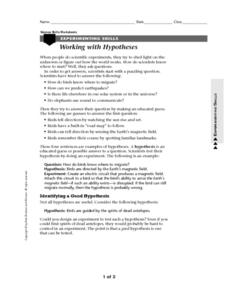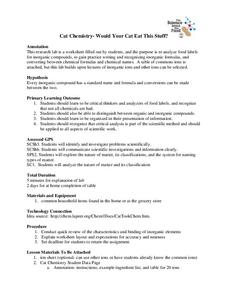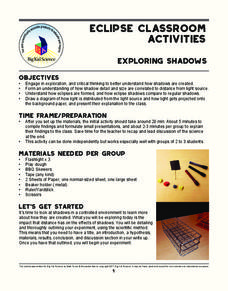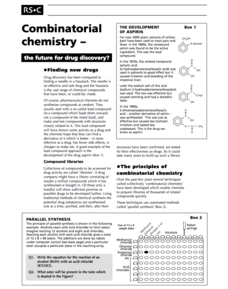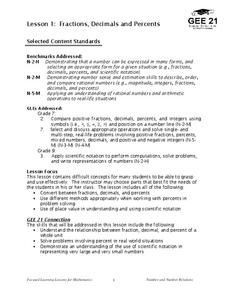Curated OER
Salinity Experiment
For this salinity experiment worksheet, students follow the procedures to set up an experiment about how salinity affects the weight of water.
Curated OER
Working With Hypotheses
In this science worksheet, learners examine the topic in order to solidify knowledge covered in the curriculum using puzzles and creative games.
University of Georgia
Would Your Cat Eat This Stuff?
Processed foods use inorganic compounds for flavoring and preservation. This take-home laboratory challenges scholars to find 20 different compounds identified on the labels of foods to list on their data collection sheet. The activity...
Big Kid Science
Exploring Shadows
What's that lurking in the shadows? An activity that demonstrates how eclipses happen. Science scholars investigate how light and distance interact to form shadows. The experiment uses simple materials to generate data and observations...
Teach Engineering
Insulation Materials Investigation
Don't melt away! Pairs investigate different insulation materials to determine which one is better than the others. Using a low-temp heat plate, the teams insulate an ice cube from the heat source with a variety of substances. They...
Royal Society of Chemistry
Combinatorial Chemistry—Chemistry Now
Finding new drugs has been likened to finding a needle in a haystack. How do pharmaceutical companies do it? One of a small series of four informative leaflets examines combinatorial chemistry, the method at the forefront of new drug...
Curated OER
Observations of a Mammal
Observations are a key step in the scientific method. In a fun activity, kids learn more about a mammal that they know, such as their own cat, a class hamster, or a friend's dog, through making detailed observations. In addition, they...
Curated OER
Plants In Space
In this biology worksheet, students grow corn plants in growth pouches as the control group in an experiment on plant growth in microgravity. Then they analyze any differences that occur between Earth-grown and space-grown corn plants.
Curated OER
Investigating Interesting Insect Information
In this investigating interesting insect information worksheet, students answer 28 short answer questions about insects. This page includes several links to helpful web resources.
Curated OER
Milkweed and Monarch Butterfly Mania Observations
In this milkweed and monarch butterfly mania observations worksheet, students observe the photo, take notes and make a prediction about the habitat of the monarch butterfly. This page has serveral links to helpful web resources.
Louisiana Department of Education
Fractions, Decimals, and Percents
Fractions, decimals, and percents all say the same thing! Show your classes how to convert between the three forms using visual and numeric representations. Then lead them to an understanding of scientific notation.
Curated OER
Classification/Taxonomy/Statistics Review
"Does King Phillip Cry Over Flimsy Grass Stems?" You might not answer that question with this exhaustive worksheet, but your biology class will get the full scoop on the hierarchy of biological classification with this resource. It...
American Physiological Society
It’s the Heart of the Matter
Get the class jumping for joy with a fascinating look at matters of the heart. Learners perform physical tasks, collect and analyze heart rate data, and study conditions that affect heart health. Use the action-packed lesson...
American Physiological Society
What Environmental Conditions Lead to the Hatching of Brine Shrimp?
Will changing the environment in which brine shrimp live impact their reproductive success? Young scientists get hands-on experience studying the habitat of brine shrimp in a two-week immersion activity. The teacher's guide provides all...
American Physiological Society
How Does the Density of a Liquid Affect the Buoyancy of an Object?
Here's a lesson plan that will really float your boat! Introduce physical science scholars to the relationship between buoyancy and density through an assortment of individual and collaborative exercises. Lab groups work together to...
Utah Education Network (UEN)
Microwave Magic
The microwave is a staple in many American households, but how exactly does it work? Approach this question from a scientific and practical standpoint, and discover cooking strategies, recipes, and methodologies for the standard...
Curated OER
What is Classification?
For this classification worksheet, students describe the difference between Homo erectus and Homo sapiens. Then they define taxonomy and explain what was wrong with Aristotle's method of classification. Students also describe their...
Curated OER
Milk and Monarch Butterfly Mania Journal Entry
In this milk and monarch butterfly mania journal entry learning exercise, students write a scientific journal entry about the milkweed plant, using the information from another linked website. This learning exercise includes many...
Compassion in World Farming Trust
Selective Breeding of Farm Animals
Biology learners read about selective breeding in chickens and how it has produced high-yield meat specimens and rapid egg-layers. The unpleasant effects of artificial selection are explored, as well as options to supporting this...
Curated OER
Forming a Hypothesis
In this hypothesis worksheet, students read about how to form a hypothesis and how to collect observations. Students go through the 4 steps of forming a hypothesis.
Kenan Fellows
Microorganisms in Pond Water
That is living in the water? Groups of two to three view pond water with microscopes in order to find microorganisms. They draw pictures of the ones they find in their slides. The groups compare their drawings to pictures of common...
Wilderness Classroom
Pollution
Educate scholars on pollution—air, water, and land—with a series of lessons that begin with a thorough explanation of each type. Learners then take part in three activities to reinforce the importance of reducing pollution. They...
WindWise Education
Which Blades Are Best?
If I change the length, will they work better? After brainstorming the variables of wind turbine blade design, groups choose one variable to isolate and test. The groups then present their data to the class in order for all to have the...
Curated OER
Plant Processes
In this science learning exercise, students explore why plants grow in a certain direction by asking a question and using the scientific method to perform the lab.



